Engender blog
3 Steps to Achieving Primary Prevention in Public Transport
We’ve launched our new series of mini-briefings shining a spotlight on how to achieve a primary prevention approach in different areas of public policy with this new briefing highlighting why safe and accessible public transport is key to gender equality and preventing violence against women.
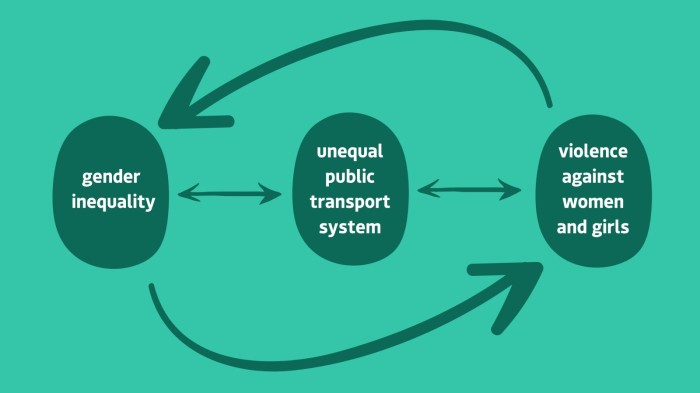
Public transport isn’t just a matter of convenience; for many women, it’s a lifeline that opens doors to education, employment, and essential services, all of which impact gender equality.
However, Scotland’s public transport system fails to serve women’s distinct travel needs, limiting their access to these opportunities and reinforcing gender inequality. Without changes, these limitations keep women from fully participating in society, impacting everything from their financial independence to safety and personal well-being.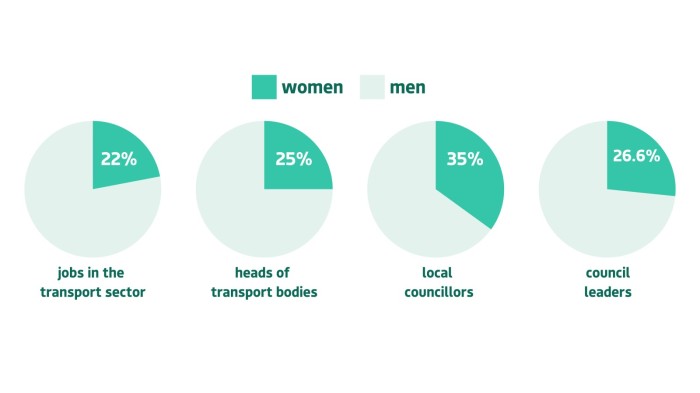
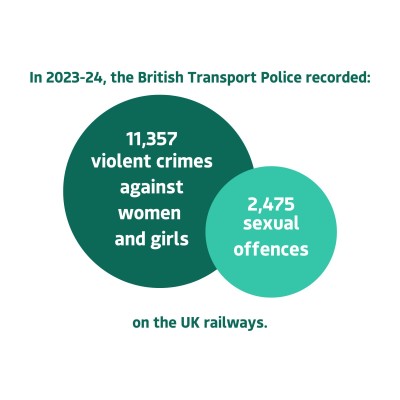 When we talk about primary prevention of VAWG, we’re talking about preventing this violence from happening in the first place. Evidence shows the best way to do this is to tackle the root cause of this violence: gender inequality. Therefore, creating a safe, sustainable and accessible public transport system for everyone is essential for advancing women’s equality and preventing VAWG once and for all.
When we talk about primary prevention of VAWG, we’re talking about preventing this violence from happening in the first place. Evidence shows the best way to do this is to tackle the root cause of this violence: gender inequality. Therefore, creating a safe, sustainable and accessible public transport system for everyone is essential for advancing women’s equality and preventing VAWG once and for all.
Without safe and accessible transport options, women’s access to critical economic and social opportunities is limited, reinforcing gender inequality, which ultimately enables VAWG. Women’s safety on public transport remains a significant concern and barrier to women’s mobility, due to things like lack of regular and reliable services, design of vehicles and transit points, and insufficient staffing levels.
Our new briefing highlights Three Steps Towards Achieving a Primary Prevention Approach in transport Policy
1. Women are equally and fairly represented in policy-making roles
- Improve pathways for women, particularly minoritised women, into the transport sector and career progression opportunities
- Ensure inclusive working environments in the transport sector by implementing flexible working procedures, anti-discrimination and harassment policies and women’s leadership initiatives
2. Policymakers consistently apply intersectional gender analysis in their work
- Collect intersectional gender-sensitive sex-disaggregated data on women’s travel patterns, safety and satisfaction
- Conduct Equality Impact Assessments at the outset of transport policy development to ensure this informs policy and planning decisions at all stages
3. Policymakers mainstream primary prevention in all areas of their work
- Increase opportunities for co-designing transport strategies with women, especially those with lived experience of VAWG on public transport
- Embed women’s safety considerations into transport planning, including in decisions on service provision, the design of infrastructure and staffing levels
Find out more in our new briefing here and follow us on social media to get the latest news on other briefings in the series on housing and planning, coming soon!
Broken and biased: new report shows impact of housing emergency on women
A new report published today by Shelter Scotland and Engender shines a light on the disproportionate impact of the housing emergency on women, and the additional barriers they face in accessing safe, secure, affordable, housing.
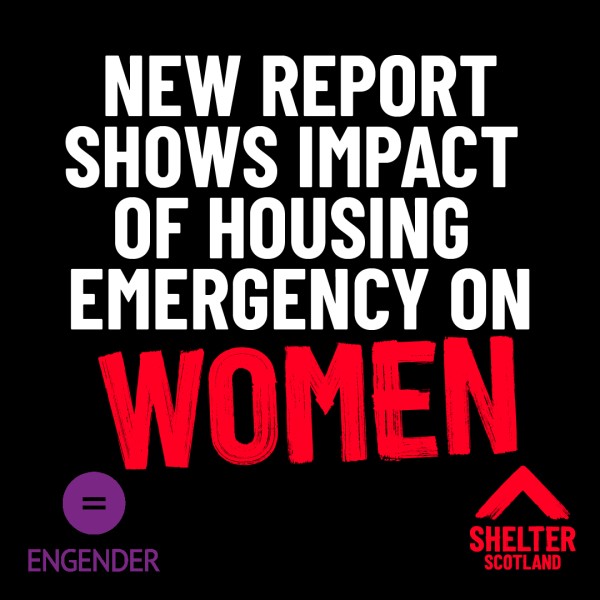
The report, released on Challenge Poverty Week’s Housing Day, shows that the higher rates of poverty among women and their greater reliance on social security benefits restricts their access to housing, with barriers being particularly pronounced for minoritised women.
It also sets out that homelessness services in Scotland are often unequipped to respond to women’s specific needs, particularly those fleeing domestic abuse. Women’s caring responsibilities and concerns over safety also create additional requirements for the type of temporary homeless accommodation that they need to access, which local services too often fail to meet.
Calling for action to address the housing emergency from a gendered perspective, the report makes a series of recommendations, including:
- Improve women’s access to safe, secure, and affordable homes by increasing the supply of social housing.
- Changes to social security to tackle women’s economic inequality, including the establishment of a ‘fund to leave’ for women experiencing domestic abuse.
- Adopting a gendered approach to the allocation and supply of temporary accommodation, taking particular account of women’s needs with regards to gender-based violence and childcare responsibilities.
- Investment in research and improved data collection to ensure women’s homelessness, including those with no recourse to public funds, is better understood and not ‘hidden’ from official monitoring.
The report argues that decades of underinvestment in social homes combined with years of austerity has created a housing system which is not only broken but biased as well.
Shelter Scotland Director, Alison Watson, said:
“This report sets out in the clearest terms the specific and disproportionate harm done to women by the housing emergency.
“Following on from the devastating homelessness figures published recently, the report is a timely reminder that Scotland’s housing system is not only utterly broken, but also biased as well.
“We know that when it comes to housing councils are breaking the law on an industrial scale, denying support to those who need it and are entitled to it; for a woman fleeing domestic violence the consequences of being turned away could be utterly catastrophic.
“Childcaring responsibilities are also far more likely to fall to women, so growing child homelessness will of course have a hugely disproportionate impact on women in Scotland.
“Scotland’s housing emergency is devastating the lives of women every day; every level of government has a responsibility to act and to heed the recommendations in this report.”
Engender’s Executive Director, Catherine Murphy, said:
“Our report with Shelter Scotland demonstrates the multiple barriers that our current housing system stacks in front of women, and the shocking ways it ignores their specific needs, pushing women into cycles of poverty and instability.
“The situation is even worse for women dealing with multiple layers of inequality. BME, disabled, and refugee women, lone parents, and those with caring responsibilities, often face relentless difficulty in securing stable housing.
“The official homelessness statistics tell us only a fraction of the story, as they fail to capture the complexity of women’s experiences, leaving them ‘hidden’ from our understanding of the problem.
“The recent pilot fund for women experiencing domestic abuse is a positive step, but it barely scratches the surface of what’s needed to address the housing emergency women face.
“Any serious response to Scotland’s housing crisis must start with acknowledging the deep gender bias in the system and taking targeted action to improve women’s access to safe, secure, and affordable homes.”
You can read the full report here, and come along to our joint webinar on 31st October to find out more about the action required to address the housing emergency from a gendered perspective. Book your free place here.
8 Steps Towards Women’s Equality in Scotland
Ahead of the next Programme for Government for 2024-25, we have outlined several important actions we want the Scottish Government to take to protect women’s rights and promote gender equality in Scotland.

Engender advocates for a Scotland where women are involved in all political and economic decisions, both as decision-makers and individuals affected by these decisions. This means recognising the diverse experiences of all women, including those facing multiple forms of discrimination, such as Black and minority ethnic women, younger and older women, disabled women, lesbian, bisexual, and trans women, women from rural areas, and those who are mothers, women who have experienced domestic abuse or men’s violence, and those experiencing poverty.
We have identified eight key actions in three main areas that need change:
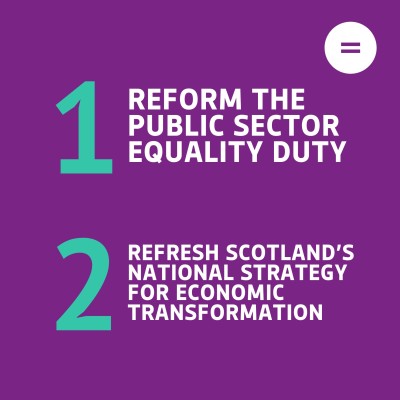 EMBED GENDER EQUALITY ACROSS ALL SCOTTISH GOVERNMENT POLICY
EMBED GENDER EQUALITY ACROSS ALL SCOTTISH GOVERNMENT POLICY
To achieve the Scottish Government’s main goals—eliminating child poverty, boosting the economy, addressing climate change, and improving public services—it’s crucial to improve how gender equality is considered across policymaking. These goals affect women and men differently, especially for women facing additional marginalisation. If policies don’t account for structural inequalities, their benefits for Scotland’s most disadvantaged people will be limited.
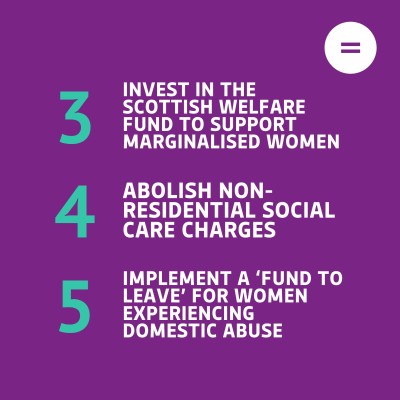 ADDRESS WOMEN’S POVERTY AND FINANCIAL INEQUALITY
ADDRESS WOMEN’S POVERTY AND FINANCIAL INEQUALITY
Eliminating child poverty is the First Minister’s top priority. To succeed, the Programme for Government must connect women’s poverty with children’s poverty. There’s an urgent need to get financial support to the most vulnerable families in Scotland, and focusing on women’s economic inequality is often the most effective approach. This must include targeted actions which tackle the disproportionately negative impacts that the cost of living crisis is having on women’s lives, especially for women who experience other forms of marginalisation.
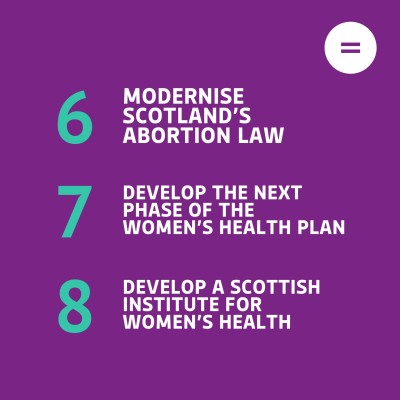 TACKLE WOMEN’S HEALTH INEQUALITIES AND PROTECT REPRODUCTIVE RIGHTS
TACKLE WOMEN’S HEALTH INEQUALITIES AND PROTECT REPRODUCTIVE RIGHTS
Women and girls still face inequalities in health and wellbeing and access to services compared to men and boys, mainly due to gender inequality and “medical misogyny.” Marginalised women, including women of colour, disabled women, unpaid carers, LGBTI+ women, younger and older women, and migrant women, experience even wider disparities in health outcomes. We urgently need updated abortion laws that uphold women’s rights and action to advance Scotland’s Women’s Health Plan.
Read more about all our asks here.
3 ways to support 16 Days of Activism in Scotland
Engender is proud to work with our sisters in Scotland's violence against women sector, and today we're sharing three ways you can support their essential work during the 16 Days of Activism Against Gender-Based Violence.
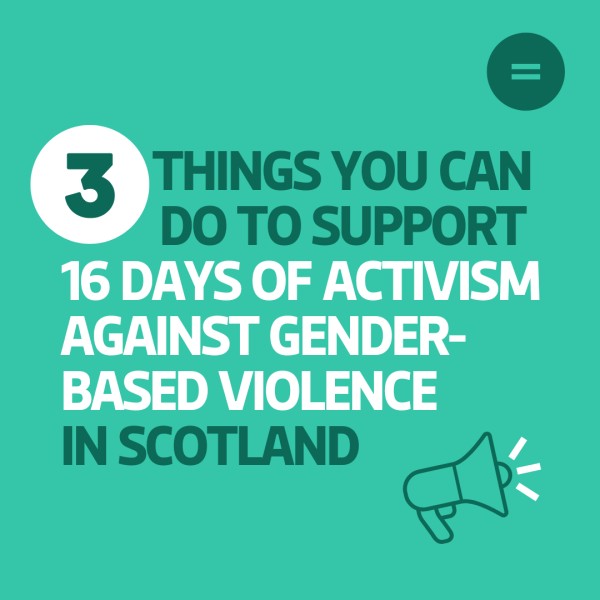
Violence against women is endemic in Scotland, and to eradicate men's violence against women, we need to tackle women's inequality with men across all areas of life.
Every year, women's groups and organisations across Scotland come together to mark the 16 Days campaign, and we’ve highlighted three ways you can take action to support the ongoing work to eradicate violence against women and girls in Scotland.
1. Write to your MSPs to tell them survivors can’t wait
The support Rape Crisis Centres across Scotland offer can be truly lifesaving. When a survivor reaches out for that support, they need to receive it then. Not weeks or months later. But this is the reality facing too many survivors across Scotland.
This campaign from our sisters at Rape Criss Scotland is calling on the Scottish Government to:
• Extend the emergency waiting list funding beyond March 2024 to save 28 jobs
• Commit to long-term sustainable funding for Rape Crisis Centres in Scotland
Write your MSP to ask them to support these calls and tell them survivors can’t wait using the template letter here. You can find out who your MSP is by using writetothem here.
2. Join the #ForThemAll Online Vigil on Friday 8th December
In the last 12 months, at least nine women in Scotland died from domestic abuse. Each woman’s death is a tragedy. Each woman’s death leaves behind trauma and grief. Each woman’s death was preventable.
For the second year, Scottish Women’s Aid will be holding their #ForThemAll online Vigil in memory of all the women and children who have died because of domestic abuse. The idea for the vigil came from Scottish Women’s Aid’s own Survivor Reference Group, which plays a key role in ongoing policy, practice and campaign work.
Take part in this night of remembrance and reflection from 7pm on Friday 8th December, by lighting a candle and sharing your reflections on social media using #ForThemAll.
3. Follow @16days_scotland and check out their resources
A Scotland without violence against women and girls is possible, and tackling VAWG is everyone’s business. By addressing gender inequality and prioritising primary prevention in all areas of public policy, we can have a Scotland where women and men have equal access to rights, resources, decision-making, and safety.
The National Violence Against Women Network have developed a toolkit of resources with information and graphics highlighting the work of 16 Days of Activism Against Gender-Based Violence campaigns across Scotland.
Access the toolkit and resources online here, and follow @16days_scotland to see and share key statistics and messages throughout the 16 Days of Activism.
The 16 Days of Activism Against Gender-Based Violence is an annual international campaign that runs from 25th November, the International Day for the Elimination of Violence Against Women, until 10th December, Human Rights Day. Throughout the 16 Days, we’ve been sharing information and updates on our social media from organisations across Scotland, so follow us on Instagram, Facebook, Twitter and Linkedin to see more.
GUEST POST: 'Text me when you're home!'
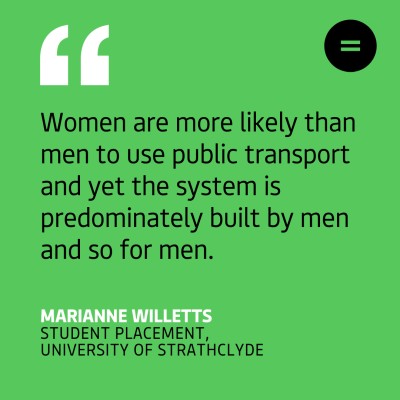
Today we're publishing the first in a series of blogs from the Spring student placements Engender hosted from the University of Strathclyde Applied Gender Studies and Research Methods course.
In this post, Marianne looks at how gender inequality and violence against women affect how women experience public spaces and public transport, and how and when these issues are recognised in the Scottish Parliament.
Keys between knuckles, hair down, earphones out. A routine all too familiar to a woman travelling home after sunset alone.
A male friend once told me that him and his flatmates had a ‘72-hour rule’; if one of them didn’t come home without telling the others where they were, they would wait 72 hours before ‘overthinking’ it and calling the police. I can’t speak for all women, but personally, if it was my female flatmate or friend, it would be at most 12 hours before the panic would set in and a further 12 before I would call the police. Women do not have the luxury of not taking precautions when commuting late at night. Travelling from A to B is necessary in many circumstances, and safety when doing so should be a given, but it is not.
Downloads
 Engender Briefing: Pension Credit Entitlement Changes
From 15 May 2019, new changes will be introduced which will require couples where one partner has reached state pension age and one has not (‘mixed age couples’) to claim universal credit (UC) instead of Pension Credit.
Engender Briefing: Pension Credit Entitlement Changes
From 15 May 2019, new changes will be introduced which will require couples where one partner has reached state pension age and one has not (‘mixed age couples’) to claim universal credit (UC) instead of Pension Credit.
 Engender Parliamentary Briefing: Condemnation of Misogyny, Racism, Harassment and Sexism
Engender welcomes this Scottish Parliament Debate on Condemnation of Misogyny, Racism, Harassment and Sexism and the opportunity to raise awareness of the ways in which women in Scotland’s inequality contributes to gender-based violence.
Engender Parliamentary Briefing: Condemnation of Misogyny, Racism, Harassment and Sexism
Engender welcomes this Scottish Parliament Debate on Condemnation of Misogyny, Racism, Harassment and Sexism and the opportunity to raise awareness of the ways in which women in Scotland’s inequality contributes to gender-based violence.
 Gender Matters in Social Security: Individual Payments of Universal Credit
A paper calling on the Scottish Government to automatically split payments of Universal Credit between couples, once this power is devolved to the Scottish Parliament.
Gender Matters in Social Security: Individual Payments of Universal Credit
A paper calling on the Scottish Government to automatically split payments of Universal Credit between couples, once this power is devolved to the Scottish Parliament.
 Gender Matters Manifesto: Twenty for 2016
This manifesto sets out measures that, with political will, can be taken over the next parliamentary term in pursuit of these goals.
Gender Matters Manifesto: Twenty for 2016
This manifesto sets out measures that, with political will, can be taken over the next parliamentary term in pursuit of these goals.
 Scottish NGO Briefing for UN Special Rapporteur on Violence Against Women
Joint briefing paper for the UN Rapporteur on Violence Against Women.
Scottish NGO Briefing for UN Special Rapporteur on Violence Against Women
Joint briefing paper for the UN Rapporteur on Violence Against Women.

Newsletter
Sign up to receive our newsletter here:
Sign up to our mailing list
Receive key feminist updates direct to your inbox: